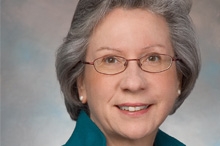Giving Children a Foundation for Learning
Harriet Henderson Coalter is being honored as a White House Champion of Change for her leadership and commitment to libraries and museums around the United States.

I have worked in smaller cities and in larger metropolitan areas, in communities with limited assets and in communities with abundant assets – but the issues tend to be the same. No matter where we live, people want to be secure, to be successful, to find meaningful work, and to have meaningful relationships. No matter where we start in life, unless we have a solid educational foundation, it’s almost impossible to end up as secure and successful adults. No matter the size of the community, it takes cooperation and commitment to see positive change take place.
I am fortunate to have found a career in public libraries, and through them, help establish that solid educational foundation for people.
At Richmond Public Library, we have focused on young children and their education, and have engaged with a variety of community agencies to try to improve school readiness. We have an early literacy coordinator and a parenting education coordinator who work almost entirely outside of the library. We engage parents and child care providers in the six pre-reading skills that children need to develop: print awareness, letter knowledge, phonological awareness, vocabulary, narrative skills, and print motivation. We encourage families to read, sing, write, talk, and play with their young children – all activities that help children develop these pre-reading skills. We empower parents through classes that build their knowledge of child development stages, helping them address the many challenges of raising a child.
We are also a partner in the national Campaign for Grade-Level Reading. This is an effort to focus community resources on helping children read on grade level by grade three, a key transition point in their education. The initiative has identified three critical areas that can affect the child’s ability to achieve this reading milestone: improve school readiness, decrease the “summer slump” that occurs when children lose reading skills over the summer break, and decrease chronic attendance problems.
People readily identify with the public library storytimes for young children. They may not so readily understand the purpose of the storytimes -- building the six pre-reading skills and modeling how parents and child care providers can best read to children at home every day.
In the same way, people readily identify with the public library summer reading program. They may not so readily understand the underlying purpose – keeping children reading over the summer to keep up their reading skills. We want them to avoid the “summer slump” and go back to school in the fall reading at the same or higher level as when they left school in June.
The public library has a positive impact on education for children, families, and neighborhoods. What a great way to be engaged with the community you live in!
Harriet Henderson Coalter is the Director of the Richmond Public Library.
White House Blogs
- The White House Blog
- Middle Class Task Force
- Council of Economic Advisers
- Council on Environmental Quality
- Council on Women and Girls
- Office of Intergovernmental Affairs
- Office of Management and Budget
- Office of Public Engagement
- Office of Science & Tech Policy
- Office of Urban Affairs
- Open Government
- Faith and Neighborhood Partnerships
- Social Innovation and Civic Participation
- US Trade Representative
- Office National Drug Control Policy
categories
- AIDS Policy
- Alaska
- Blueprint for an America Built to Last
- Budget
- Civil Rights
- Defense
- Disabilities
- Economy
- Education
- Energy and Environment
- Equal Pay
- Ethics
- Faith Based
- Fiscal Responsibility
- Foreign Policy
- Grab Bag
- Health Care
- Homeland Security
- Immigration
- Innovation Fellows
- Inside the White House
- Middle Class Security
- Open Government
- Poverty
- Rural
- Seniors and Social Security
- Service
- Social Innovation
- State of the Union
- Taxes
- Technology
- Urban Policy
- Veterans
- Violence Prevention
- White House Internships
- Women
- Working Families
- Additional Issues

